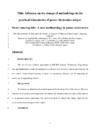Please use this identifier to cite or link to this item:
https://accedacris.ulpgc.es/jspui/handle/10553/77789
| Title: | Influence of the change of methodology in the practical laboratories of the power electronics subject | Authors: | Cabrera Peña, José María Quevedo, Eduardo Fabelo, Himar Ortega, Samuel Marrero Callicó, Gustavo Zapatera-Llinares, Alberto |
UNESCO Clasification: | 3307 Tecnología electrónica | Keywords: | Demonstration Method Power Electronics Project-Based Learning |
Issue Date: | 2021 | Project: | Identificación Hiperespectral de Tumores Cerebrales (Ithaca) Plataforma H2/Sw Distribuida Para El Procesamiento Inteligente de Información Sensorial Heterogenea en Aplicaciones de Supervisión de Grandes Espacios Naturales |
Journal: | Computer Applications in Engineering Education | Abstract: | The use of novel didactic approaches in Science, Technology, Engineering, Arts and Mathematics (STEAM) academic programs is a relevant topic in current educational research. In this context, Project-Based learning is shown as a promising didactic tool for improving the motivation of engineering students. Objective: To propose an adapted project-based approach for lecturing on Power Electronics. The main objective of the project-based approach is to enhance the attention and motivation of the students in the practical lessons, increasing their knowledge about the subject and, hence, improving results in the theoretical part of the subject. Methods: First, we propose a project which combines all the theoretical aspects related to the subject Power Electronics, namely. “Power, Control, Monitoring and Supervision System of an Electric Motor.” Second, each subsystem of the final project is analyzed during each practical lesson, and simulation environments and real circuit manipulations are used for introducing complex Power Electronics concepts to undergraduate students. Results: This project-based methodology has been compared with the demonstration method followed in the previous course by using the validated Students' Evaluations of Educational Quality survey (SEEQ). Conclusions: The results show that the adopted methodology has clearly improved the SEEQ results with respect to the demonstration method. | URI: | https://accedacris.ulpgc.es/handle/10553/77789 | ISSN: | 1061-3773 | DOI: | 10.1002/cae.22390 | Source: | Computer Applications in Engineering Education[ISSN 1061-3773], v. 29(5), p. 1358-1371 |
| Appears in Collections: | Artículos |
SCOPUSTM
Citations
7
checked on Jun 8, 2025
WEB OF SCIENCETM
Citations
4
checked on Feb 8, 2026
Page view(s) 10
122
checked on Jan 10, 2026
Download(s)
2
checked on Jan 10, 2026
Google ScholarTM
Check
Altmetric
Share
Export metadata
Items in accedaCRIS are protected by copyright, with all rights reserved, unless otherwise indicated.
